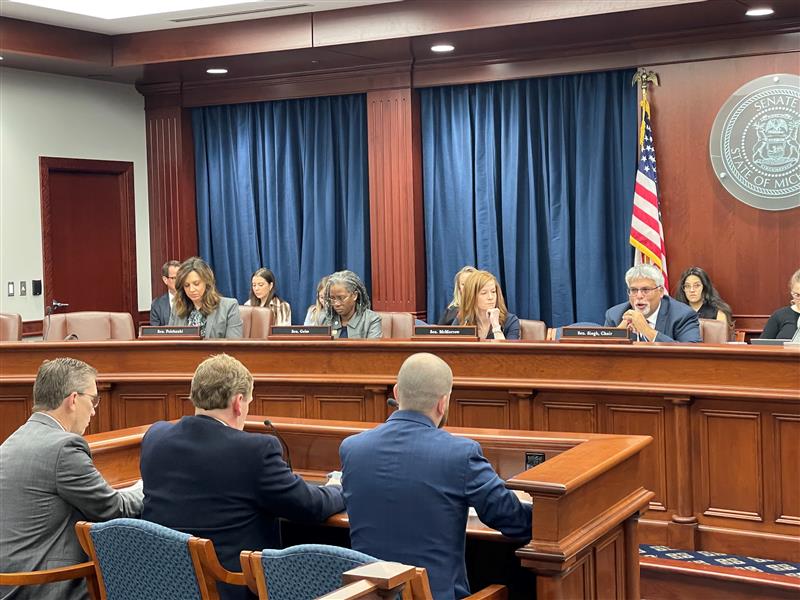On October 25, Senate Oversight Committee members heard testimony on the newly introduced, bipartisan financial disclosure bills put forth to help improve government transparency and codify Proposal 1 of 2022 — which was supported by 2.8 million Michigan voters just last year.
Senate Bills 613–616 would improve government transparency by requiring financial disclosure of assets and income above certain limits from elected officials and candidates for public office. According to Sen. Jeremy Moss (D–Southfield), it is a long-awaited first step in the process.

Bill sponsors (including Sens. Jeremy Moss (D-Southfield, front right), Ed McBroom (R-Waucedah Township, front middle) and Mark Huizenga (R-Walker, front left) offer testimony in the Senate Oversight Committee chaired by fourth bill sponsor Sen. Sam Singh (D-East Lansing). (Photo by Senate Majority Communications, October 2023)
“Several sessions ago, I cosponsored legislation as a state representative to require conflict disclosure from lawmakers,” said Sen. Moss. “Our efforts were blocked time and time again by previous majorities, so citizens rightfully took this initiative into their own hands last year.”
These four bills demonstrate the strong bipartisan leadership focused on this effort and commitment to making much-needed progress on this issue.
Senate Majority Leader Winnie Brinks (D-Grand Rapids) said, “The voters demanded transparency, and we happen to agree with them. Measures to shine light on the state legislature and those who serve here are long overdue. I am proud we are taking this important first step — led by a bipartisan coalition — to establish personal finance disclosure rules for state representatives, senators, the governor, attorney general and secretary of state in accordance with the ballot measure passed in 2022.”
The bills implement the constitutional requirements of Proposal 1 of 2022, and go beyond in the following ways:
- SB 613 (Moss) requires executive office holders (governor, lieutenant governor, attorney general, secretary of state) and legislators to file annual financial disclosure reports that will be posted on the Secretary of State website.
- SB 614 (Singh) requires candidates for these offices to file financial disclosure reports so voters can weigh any potential conflicts before selecting their representatives.
- SBs 615 and 616 (Huizenga and McBroom) allow late filing fees to be paid from a candidate committee (mirroring current law for campaign finance filings).
Financial disclosure reports will cover all sources of income, investment assets, positions held in organizations, and significant liabilities. They cover joint assets held with a spouse and require disclosure of the spouse’s occupation so potential conflicts can be identified.
“For those of us who have been on this years-long journey of pushing for more transparency from legislators and other officeholders, this is a huge step forward to holding our elected officials accountable to the citizens they represent,” said Moss. “This is a full-circle moment to achieve the goals we set out years ago to enact Michigan’s first-ever financial disclosure law that would reveal conflicts of interests from lawmakers. Our Prop. 1 legislation is not an end but a long-overdue beginning to finally implementing transparency laws.”
Read more from the Michigan Senate Democrats at SenateDems.com/press.
